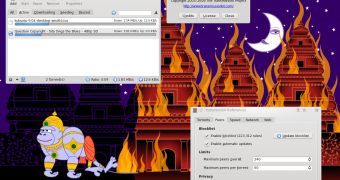All BitTorrent users will be happy to hear that a new version of the popular Transmission client has been released, for both Linux and Mac platforms. Transmission 1.6.0 brings a beta client for the Qt framework as well as important new features and improvements.
Users will now be able to limit the seed ratio and prioritize transfers. Also, in 1.6.0, torrents can be individually configured to either follow the global bandwidth limits or use custom settings. Improvements have been done on the UPnP port forwarding option too, and support for file preallocation on XFS filesystems was added.
Other highlights of Transmission 1.6.0 for Linux:
· Random port, including an optional randomization ability; · A second set of speed limits can now be configured and applied or scheduled; · The properties window can now display multiple torrents at the same time; · Torrents can now be arranged by size and ETA (estimated time of arrival); · Torrents will now display icons according to their contents; · In the Transmission Daemon, folders can now be watched in order to auto-add torrents from them; · The RPC/JSON interface in the Daemon has been improved; · Users can now manually specify addresses when listening for new peers in the Daemon; · Single files can now be selected and prioritized in the Web Client; · A new option to verify local data was added to the Web Client; · Fixed the "Remove Data" bug.
About Transmission
Transmission is an open-source, cross-platform, BitTorrent client that aims to provide a powerful, yet simple-to-use solution. The application is configured to work "out of the box" with the default settings, while more advanced features can also be easily accessed for a more in-depth setup. Transmission was written in the C programming language and needs a lot fewer resources than most other clients. It is also the default BitTorrent client in the popular Ubuntu Linux distribution.
Download Transmission 1.6.0 for Linux right now from Softpedia.

 14 DAY TRIAL //
14 DAY TRIAL //